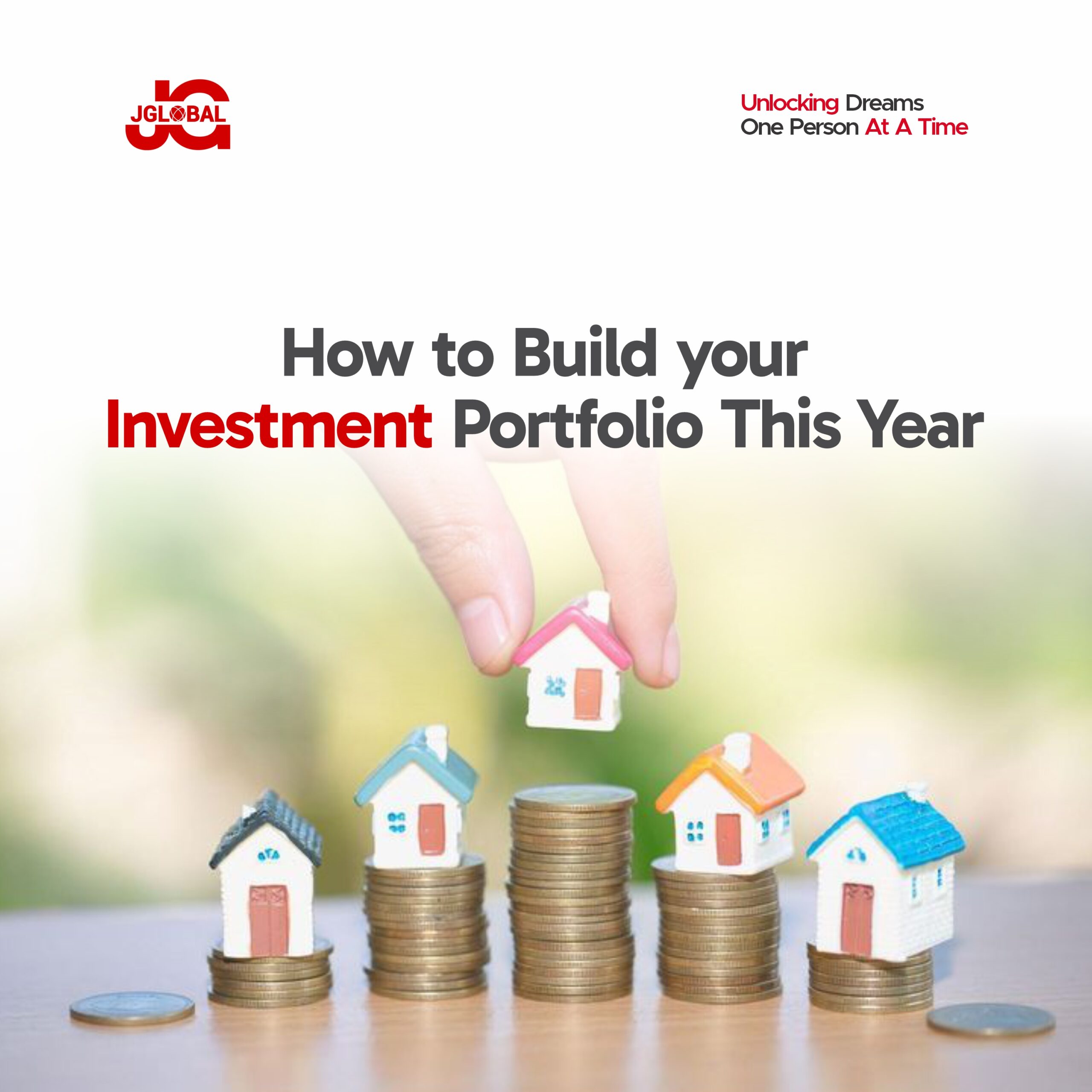BUILDING YOUR INVESTMENT PORTFOLIO IN 2025

Let’s talk about how you can build a solid investment portfolio this year. We’ll share practical tips on how to build a balanced portfolio in the real estate sector either as a long time real estate investor or a newbie while keeping things simple and straightforward.
What is an investment portfolio in Real Estate?
In real estate, an investment portfolio refers to a collection of properties or investments that an individual or organization owns and manages to generate income, appreciate in value, or achieve other financial goals.
A real estate investment portfolio can include a variety of assets, such as:
- Rental properties (residential or commercial)
- Real estate investment trusts (REITs)
- Real estate mutual funds
- Real estate crowdfunding investments
- Direct property investments (e.g., fix-and-flip, wholesaling)
- Real estate notes (e.g., private lending, mortgage notes)
- Real estate partnerships or joint ventures
Benefits of a real estate investment portfolio
A well-diversified real estate investment portfolio can provide benefits to investors such as:
- Income generation through rental income, dividends, or interest payments
- Potential long-term appreciation in property values
- Diversification of risk across different asset classes, locations, and property types
- Tax benefits, such as depreciation and interest deductions
- Potential for leverage through financing and other financial instruments
When considering building your real estate portfolio, you should first understand what you want to achieve.
Start with the Foundation:
Real estate remains one of the most reliable ways to build wealth. In today’s market, there are great opportunities in residential properties, particularly in growing suburban areas (emerging areas). Why? More people are looking for homes with extra space for remote work, and this trend isn’t going anywhere soon.
Here are some specific goals you can achieve
- Cash flow generation
- Long-term wealth creation
- Retirement income
- Tax optimization
- Diversification of your overall investment portfolio (to get more property investments)
Mix It Up (diversification):
Don’t Put All Your Eggs in One Basket. Achieving a balanced portfolio in real estate investing means avoiding a one-sided approach. Experienced investors consider multiple factors and maintain a flexible mindset, as circumstances can change unexpectedly.
Many new investors focus on a “buy and hold” strategy, seeking assets that appreciate in value over time. This approach is based on the idea of investing in assets that will increase in value and holding them for as long as possible.
However, this strategy can be limiting, as it may cause investors to overlook properties that are less attractive in terms of appreciation but offer strong cash flow potential. By focusing too heavily on appreciation, investors may miss out on opportunities to generate regular income from their investments.
Ultimately, a balanced investment strategy considers both appreciation and cash flow. Focusing too heavily on one aspect can leave investors vulnerable to unexpected expenses or market changes. By maintaining a balanced approach, investors can reduce their risk and increase their potential for long-term success.
Understanding Market Cycles
The real estate market moves in cycles, and right now we’re seeing interesting patterns. Inflation have been a hot topic, but don’t let that scare you. When rates are higher, it is best to consider your investment needs and go out to get it. Because the truth is “that property that cost 1 naira today might be a million naira tomorrow.
Smart Investment Strategies for 2025
Let’s get practical if you are ready to build your investment portfolio
- Focus on Growth Areas: Look for neighborhoods where new businesses are opening, and infrastructure is improving. These areas often see property values rise faster than average.
- Consider Small Commercial Properties: Strip malls and small office buildings in suburban areas are becoming increasingly valuable as businesses adapt to hybrid work models.
- Explore REITs: If you’re new to real estate investing or don’t want to manage properties directly, REITs offer a great way to get into the market. They’re like mutual funds for real estate, and you can start with a smaller amount of money.
- Think About Cash Flow not only Landbanking: Don’t just focus on potential appreciation. Look for properties that can generate steady rental income. This is especially important in these uncertain economic times.
Here is everything you need to know about Landbanking
Managing the Risk that comes with Real Estate Investing
Remember, no investment is without risk. But the risks in real estate can be properly managed if you:
- Always keep an emergency fund separate from your investment money
- Get thorough property inspections before buying
- Work with experienced professionals (real estate agents, property managers, accountants)
- Stay informed about market conditions
- Consider insurance options very carefully
Read more on property insurance in Nigeria
How do you Make Your First Move in Building your portfolio
- Start by analyzing your current financial situation. How much can you invest? What’s your risk tolerance? What’s your timeline? These answers will help shape your investment strategy.
- Building your portfolio is a journey, not a race. Take your time to research and understand each investment. Don’t feel pressured to buy something just because it seems like a good deal.
- Keep an eye on market trends, but don’t let short-term fluctuations shake your long-term strategy. Real estate has historically been one of the most reliable ways to build wealth, and with careful planning, 2025 could be your year to start or expand your investment portfolio.
Read more on the various trends that will shape the real estate market
Need More Help?
Consider contacting Jglobalproperties. We can help you create a personalized investment strategy that aligns with your goals and risk tolerance, making your investment work harder for you.
Remember, the key to successful investing isn’t just buying properties – it’s buying the right properties at the right time and managing them well. Take these insights, adapt them to your situation, and start building your portfolio with confidence.



